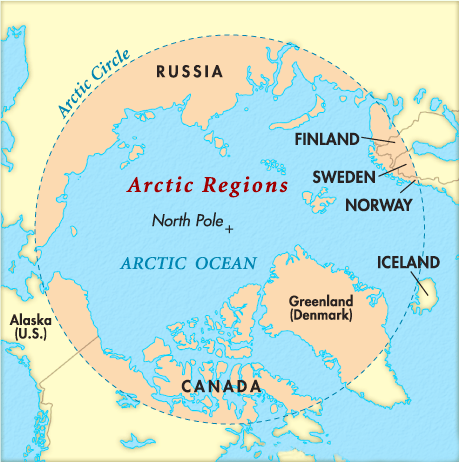Arctic: Concerns & Opportunities | 02 Jan 2021
Why in News
As per the WWF-Arctic Programme, the Arctic region is warming up twice as fast as the global average. The ice cap has been shrinking fast since 1980 and the volume of Arctic sea ice has declined by as much as 75%.
- Since 1992, WWF's (World Wide Fund for Nature) Arctic Programme has been working with its partners across the Arctic to combat threats to the Arctic and to preserve its rich biodiversity in a sustainable way.
Key Points
- About Arctic:
- The Arctic is a polar region located at the northernmost part of Earth.
- The Arctic consists of the Arctic Ocean, adjacent seas, and parts of Alaska (United States), Canada, Finland, Greenland (Denmark), Iceland, Norway, Russia, and Sweden.
- Land within the Arctic region has seasonally varying snow and ice cover.
- Ecological Impact of Warming on Arctic:
- The loss of ice and the warming waters will affect sea levels, salinity levels, and current and precipitation patterns.
- The Tundra is returning to swamp, the permafrost is thawing, sudden storms are ravaging coastlines and wildfires are devastating interior Canada and Russia.
- Tundra: Found in regions north of the Arctic Circle and south of the Antarctic Circle. These are treeless regions.
- The phenomenally rich biodiversity of the Arctic region is under serious threat.
- The absence of year-long ice and higher temperatures are making the survival of Arctic marine life, plants and birds difficult while encouraging species from lower latitudes to move north.
- The Arctic is also home to about 40 different indigenous groups, whose culture, economy and way of life is in danger of being swept away.
- Increasing human encroachment with its attendant stresses will only aggravate this impact and upset a fragile balance.
- Commercial Importance of Arctic:
- The opening of the Arctic presents huge commercial and economic opportunities, particularly in shipping, energy, fisheries and mineral resources.
- Commercial navigation:
- The Northern Sea Route (NSR) which would connect the North Atlantic to the North Pacific through a short polar arc is the most tempting.
- Oil and natural gas deposits:
- Estimated to be 22% of the world’s unexplored resources, mostly in the Arctic ocean, will be open to access along with mineral deposits including 25% of the global reserves of rare earths, buried in Greenland.
- Issues Involved:
- Navigation conditions are dangerous and restricted to the summer.
- Lack of deep-water ports, a need for ice-breakers, shortage of workers trained for polar conditions, and high insurance costs add to the difficulties.
- Mining and deep-sea drilling carry massive costs and environmental risks.
- Unlike Antarctica, the Arctic is not a global common and there is no overarching treaty that governs it.
- Conflict over Arctic:
- Russia, Canada, Norway and Denmark have put in overlapping claims for extended continental shelves, and the right to sea-bed resources.
- Russia is the dominant power, with the longest Arctic coastline, half the Arctic population, and a full-fledged strategic policy.
- Claiming that the NSR falls within its territorial waters, Russia anticipates huge dividends from commercial traffic including through the use of its ports, pilots and ice-breakers.
- Russia has also activated its northern military bases, refurbished its nuclear armed submarine fleet and demonstrated its capabilities, including through an exercise with China in the eastern Arctic.
- China, playing for economic advantage, has moved in fast, projecting the Polar Silk Road as an extension of the Belt and Road Initiatives, and has invested heavily in ports, energy, undersea infrastructure and mining projects.
- India’s interests in Arctic:
- Environmental Interest:
- India’s extensive coastline makes it vulnerable to the impact of Arctic warming on ocean currents, weather patterns, fisheries and most importantly, the monsoon.
- Scientific Interest:
- Scientific research in Arctic developments, in which India has a good record, will contribute to its understanding of climatic changes in the Third Pole, the Himalayas.
- Strategic Interest:
- The strategic implications of an active China in the Arctic and its growing economic and strategic relationship with Russia are self-evident and need close monitoring.
- Since 2013, India has had observer status in the Arctic Council, which is the predominant inter-governmental forum for cooperation on the environmental and development aspects of the Arctic.
- It is high time that its presence on the Arctic Council was underpinned by a strategic policy that encompassed economic, environmental, scientific and political aspects.
- Environmental Interest:

